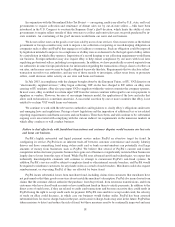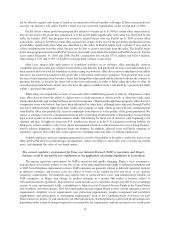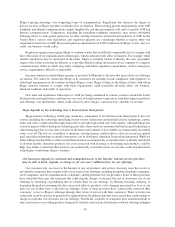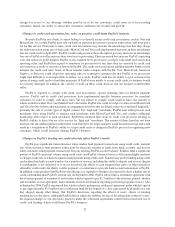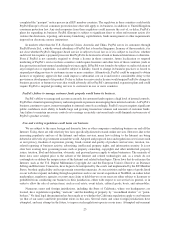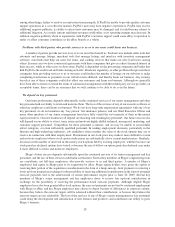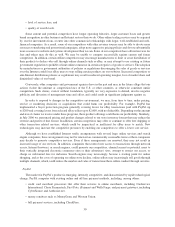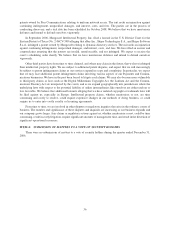eBay 2006 Annual Report Download - page 31
Download and view the complete annual report
Please find page 31 of the 2006 eBay annual report below. You can navigate through the pages in the report by either clicking on the pages listed below, or by using the keyword search tool below to find specific information within the annual report.provision of services to online gambling merchants violated provisions of the USA PATRIOTAct and further agreed
to have its compliance program reviewed by an independent audit firm. PayPal is also subject to regulations that
require it to report suspicious activities involving transactions of $2,000 or more and may be required to obtain and
keep more detailed records on the senders and recipients in certain transfers of $3,000 or more. The interpretation of
suspicious activities in this context is uncertain. Future regulations under the USA PATRIOT Act may require
PayPal to revise the procedures it uses to verify the identity of its customers and to monitor international
transactions more closely. As PayPal localizes its service in other countries, additional verification and reporting
requirements could apply. These regulations could impose significant costs on PayPal and make it more difficult for
new customers to join its network. PayPal could be required to learn more about its customers before opening an
account, to obtain additional verification of customers and to monitor its customers’ activities more closely. These
requirements, as well as any additional restrictions imposed by credit card associations, could raise PayPal’s costs
significantly and reduce the attractiveness of its product. Failure to comply with federal, state or foreign country
money laundering laws could result in significant criminal and civil lawsuits, penalties, and forfeiture of significant
assets.
We are subject to risks associated with information disseminated through our service.
The law relating to the liability of online services companies for information carried on or disseminated
through their services is currently unsettled. Claims could be made against online services companies under both
U.S. and foreign law for defamation, libel, invasion of privacy, negligence, copyright or trademark infringement, or
other theories based on the nature and content of the materials disseminated through their services. Several private
lawsuits seeking to impose liability upon us under a number of these theories have been brought against us. In
addition, domestic and foreign legislation has been proposed that would prohibit or impose liability for the
transmission over the Internet of certain types of information. Our service features a Feedback Forum, which
includes information from users regarding other users. Although all such feedback is generated by users and not by
us, claims of defamation or other injury have been made in the past and could be made in the future against us for
content posted in the Feedback Forum. Several recent court decisions have narrowed the scope of the immunity
provided to Internet service providers like us under the Communications Decency Act. This trend, if continued, may
increase our potential liability to third parties for the user-provided content on our site. Our liability for such claims
may be higher in jurisdictions outside the U.S. where laws governing Internet transactions are unsettled. If we
become liable for information provided by our users and carried on our service in any jurisdiction in which we
operate, we could be directly harmed and we may be forced to implement new measures to reduce our exposure to
this liability. This may require us to expend substantial resources or to discontinue certain service offerings, which
would negatively affect our financial results. In addition, the increased attention focused upon liability issues as a
result of these lawsuits and legislative proposals could harm our reputation or otherwise impact the growth of our
business. Any costs incurred as a result of this potential liability could harm our business.
Customer complaints or negative publicity about our customer service could diminish use of our services.
Customer complaints or negative publicity about our customer service could severely diminish consumer
confidence in and use of our services. Measures we sometimes take to combat risks of fraud and breaches of privacy
and security can damage relations with our customers. These measures heighten the need for prompt and accurate
customer service to resolve irregularities and disputes. Effective customer service requires significant personnel
expense, and this expense, if not managed properly, could significantly impact our profitability. Failure to manage
or train our customer service representatives properly could compromise our ability to handle customer complaints
effectively. If we do not handle customer complaints effectively, our reputation may suffer and we may lose our
customers’ confidence.
Because it is providing a financial service and operating in a more regulated environment, PayPal, unlike eBay,
must provide telephone as well as email customer service and must resolve certain customer contacts within shorter
time frames. As part of PayPal’s program to reduce fraud losses, it may temporarily restrict the ability of customers
to withdraw their funds if those funds or the customer’s account activity are identified by PayPal’s anti-fraud models
as suspicious. PayPal has in the past received negative publicity with respect to its customer service and account
restrictions, and has been the subject of purported class action lawsuits and state attorney general inquiries alleging,
27



